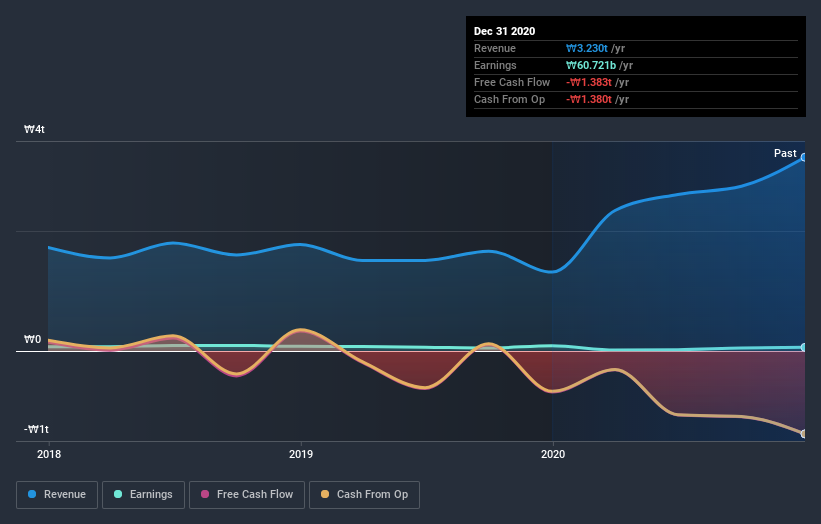- South Korea
- /
- Capital Markets
- /
- KOSE:A001720
Update: Shinyoung Securities (KRX:001720) Stock Gained 13% In The Last Year
On average, over time, stock markets tend to rise higher. This makes investing attractive. But if when you choose to buy stocks, some of them will be below average performers. Unfortunately for shareholders, while the Shinyoung Securities Co., Ltd. (KRX:001720) share price is up 13% in the last year, that falls short of the market return. In contrast, the longer term returns are negative, since the share price is 4.7% lower than it was three years ago.
See our latest analysis for Shinyoung Securities
While the efficient markets hypothesis continues to be taught by some, it has been proven that markets are over-reactive dynamic systems, and investors are not always rational. One flawed but reasonable way to assess how sentiment around a company has changed is to compare the earnings per share (EPS) with the share price.
During the last year, Shinyoung Securities actually saw its earnings per share drop 27%.
This means it's unlikely the market is judging the company based on earnings growth. Indeed, when EPS is declining but the share price is up, it often means the market is considering other factors.
We haven't seen Shinyoung Securities increase dividend payments yet, so the yield probably hasn't helped drive the share higher. Rather, we'd posit that the revenue increase of 144% might be more meaningful. Revenue growth often does precede earnings growth, so some investors might be willing to forgo profits today because they have their eyes fixed firmly on the future.
The image below shows how earnings and revenue have tracked over time (if you click on the image you can see greater detail).

You can see how its balance sheet has strengthened (or weakened) over time in this free interactive graphic.
What About Dividends?
When looking at investment returns, it is important to consider the difference between total shareholder return (TSR) and share price return. Whereas the share price return only reflects the change in the share price, the TSR includes the value of dividends (assuming they were reinvested) and the benefit of any discounted capital raising or spin-off. Arguably, the TSR gives a more comprehensive picture of the return generated by a stock. We note that for Shinyoung Securities the TSR over the last year was 19%, which is better than the share price return mentioned above. This is largely a result of its dividend payments!
A Different Perspective
Shinyoung Securities provided a TSR of 19% over the last twelve months. But that return falls short of the market. The silver lining is that the gain was actually better than the average annual return of 5% per year over five year. This suggests the company might be improving over time. While it is well worth considering the different impacts that market conditions can have on the share price, there are other factors that are even more important. For example, we've discovered 4 warning signs for Shinyoung Securities (2 make us uncomfortable!) that you should be aware of before investing here.
But note: Shinyoung Securities may not be the best stock to buy. So take a peek at this free list of interesting companies with past earnings growth (and further growth forecast).
Please note, the market returns quoted in this article reflect the market weighted average returns of stocks that currently trade on KR exchanges.
If you’re looking to trade Shinyoung Securities, open an account with the lowest-cost* platform trusted by professionals, Interactive Brokers. Their clients from over 200 countries and territories trade stocks, options, futures, forex, bonds and funds worldwide from a single integrated account. Promoted
New: Manage All Your Stock Portfolios in One Place
We've created the ultimate portfolio companion for stock investors, and it's free.
• Connect an unlimited number of Portfolios and see your total in one currency
• Be alerted to new Warning Signs or Risks via email or mobile
• Track the Fair Value of your stocks
This article by Simply Wall St is general in nature. It does not constitute a recommendation to buy or sell any stock, and does not take account of your objectives, or your financial situation. We aim to bring you long-term focused analysis driven by fundamental data. Note that our analysis may not factor in the latest price-sensitive company announcements or qualitative material. Simply Wall St has no position in any stocks mentioned.
*Interactive Brokers Rated Lowest Cost Broker by StockBrokers.com Annual Online Review 2020
Have feedback on this article? Concerned about the content? Get in touch with us directly. Alternatively, email editorial-team (at) simplywallst.com.
About KOSE:A001720
Shinyoung Securities
Provides brokerage, wealth management, investment banking, and capital market services in South Korea.
Adequate balance sheet and fair value.
Market Insights
Community Narratives



